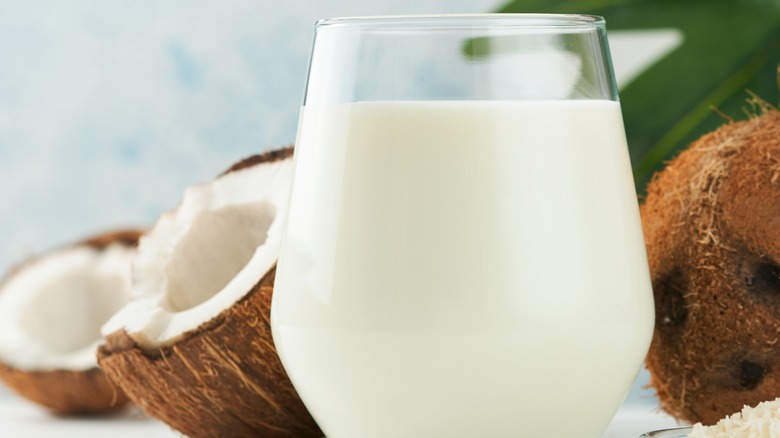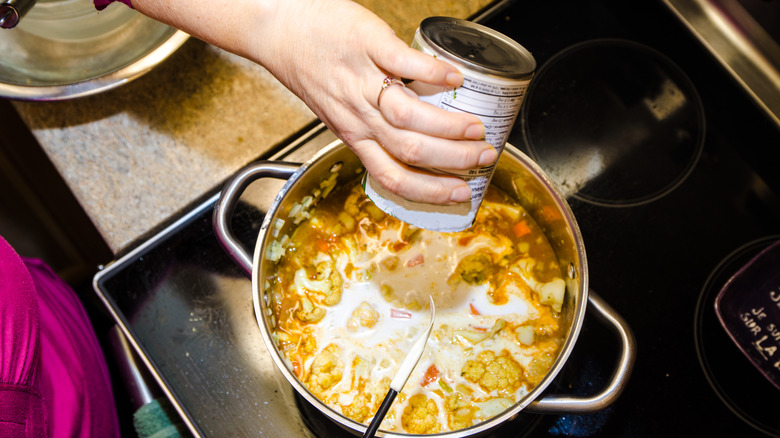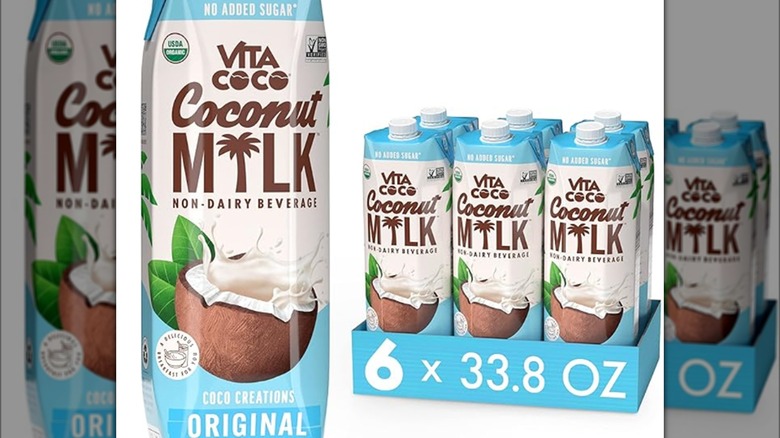Canned Coconut Milk Vs Carton: What's The Difference?
We may receive a commission on purchases made from links.
If you have never used coconut milk in the kitchen, you're missing out on the richness and creaminess it can impart to stews, soups, and sauces. This product is also a great dairy-free alternative to milk when making desserts, baked goods, and sweet beverages. But before you head to the grocery store to make your first coconut milk purchase, it's important to know that this product comes in different forms, with each one serving its own culinary purpose.
First things first: In case you're not aware yet, coconut milk is different from coconut water, which is the clear, mildly sweet, and refreshing liquid you can drink right out of a young coconut. Coconut milk is made by processing the shredded meat of mature brown coconuts. The grated flesh is mixed with hot water and then strained through a cheesecloth to produce a rich, white liquid that's known as coconut cream (this by-product is also sold in the supermarket). The cream is then further diluted with water to produce coconut milk.
Coconut milk comes in varying levels of thickness depending on the amount of water used, and that difference in texture is key when selecting the right product for your kitchen needs. To tell one from the other, let its packaging give you an idea since this product is sold either in cans or in cartons. Read on to know what makes the canned variant distinct from the one packaged in cartons, and how best to use each one in your cooking.
Canned coconut milk is creamier and best used for cooking
For richer curries and silkier soups, buy canned coconut milk. Its lightly sweet, nutty flavor comes with a thicker, creamier consistency, thanks to its higher fat content – every 100 grams of this product comes with 21.3 grams of fat. It also comes with additives that stabilize the liquid, like guar gum. When opening a can, it's common to see a layer of solidified coconut cream that has settled on top of the liquid. That's because the milk's saturated fats turn firm at room temperature. Integrate the cream back into the milk by shaking the can of coconut milk before opening it.
Recipes that call for coconut milk usually refer to the canned variant. When buying one, check that the label indicates that it's unsweetened. Otherwise, you'll end up with cream of coconut, which has a considerably higher sugar content that makes it more suitable for desserts and blended cocktails. Unless a recipe indicates it, go for full-fat coconut milk, too, since using a low-fat variant won't yield that creaminess you're looking for.
Do research as well on which brands sell bisphenol-A-free products since this chemical compound can be found in the coating of metal cans. If you don't get to use the whole can, transfer your leftover coconut milk into an airtight container and store it in the fridge. Use it within five days. Unopened cans, meanwhile, can last for months as long as you keep them in a cool, dark place.
Coconut milk sold in cartons is a great substitute for cow's milk
For a dairy-free milk alternative, buy coconut milk that's sold in cartons. It has a thinner consistency since it has been diluted with more water, although manufacturers typically add thickeners like gellan gum to give it a more dairy-like texture, as well as vitamins and minerals that make it a suitable alternative to cow's milk. This plant milk product comes in sweetened variants, too, but with less sugar than cream of coconut.
Coconut milk packaged in cartons is great for drinking straight out of the container, adding to coffee, or pouring into a bowl of cereal. Basically, you can use it in the same way you use cow's milk when cooking and baking. You can use it in place of canned coconut milk in savory dishes, too, if you're not too keen on making them extra creamy. Also, if you don't have canned coconut milk, you can create a substitute by making a cornstarch slurry, adding it to coconut milk from a carton, and boiling the mixture until it develops the consistency you want.
Conversely, you can dilute canned coconut milk with water to add it to your cereal or drinks. Just sweeten it according to your taste. Coconut milk in cartons that are available in the grocery's refrigerated section aren't shelf-stable and must be stored in the fridge. Be mindful of the provided expiration date and consume the milk within seven to ten days after opening the container.


